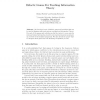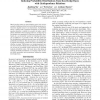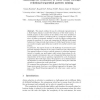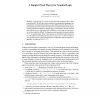4128 search results - page 96 / 826 » Learning and using relational theories |
176
Voted
ISSEP
2010
Springer
15 years 9 months ago
2010
Springer
We developed a set of didactic games and activities that can be used to illustrate and teach various concepts from Information Theory. For each of the games and activities we list ...
100
Voted
AAAI
2010
15 years 26 days ago
2010
When merging belief sets from different agents, the result is normally a consistent belief set in which the inconsistency between the original sources is not represented. As proba...
136
click to vote
CORR
2010
Springer
14 years 9 months ago
2010
Springer
This report outlines the use of a relational representation in a Multi-Agent domain to model the behaviour of the whole system. A desired property in this systems is the ability of...
137
click to vote
SOCO
2007
Springer
15 years 6 months ago
2007
Springer
In the context of Service Oriented Computing, contracts are descriptions of the externally observable behaviour of services. Given a group of collaborating services, their contract...
104
Voted
FOSSACS
2005
Springer
15 years 6 months ago
2005
Springer
Abstract. Nominal logic is a variant of first-order logic equipped with a “freshname quantifier” N and other features useful for reasoning about languages with bound names. I...




